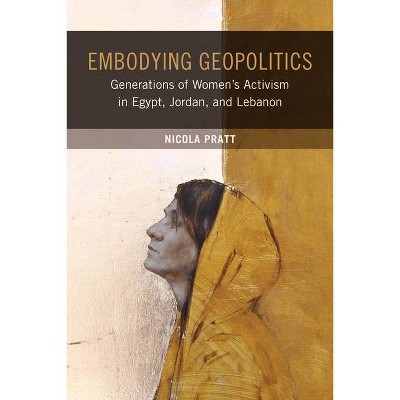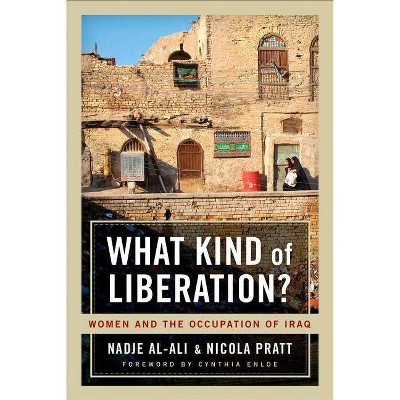Embodying Geopolitics - by Nicola Pratt (Hardcover)

Similar Products
Products of same category from the store
AllProduct info
<p/><br></br><p><b> About the Book </b></p></br></br>"When women took to the streets during the mass protests of the Arab Spring, the subject of feminism in the Middle East and North Africa returned to the international spotlight. In the subsequent years, countless commentators treated the region's gender inequality as a consequence of fundamentally cultural or religious problems. In so doing, they overlooked the specifically political nature of these women's activism. Moving beyond such culturalist accounts, this book turns to the relations of power in regional and international politics to understand women's struggles for their rights. Based on over a hundred extensive personal narratives from women of different generations in Egypt, Jordan, and Lebanon, Nicola Pratt traces women's activism from national independence through to the Arab uprisings, arguing that activist women are critical geopolitical actors. Weaving together these personal accounts with the ongoing legacies of colonialism, Embodying Geopolitics demonstrates how the production and regulation of gender is integrally bound up with the exercise and organization of geopolitical power, with consequences for women's activism and its effects"--<p/><br></br><p><b> Book Synopsis </b></p></br></br>When women took to the streets during the mass protests of the Arab Spring, the subject of feminism in the Middle East and North Africa returned to the international spotlight. In the subsequent years, countless commentators treated the region's gender inequality as a consequence of fundamentally cultural or religious problems. In so doing, they overlooked the specifically political nature of these women's activism. Moving beyond such culturalist accounts, this book turns to the relations of power in regional and international politics to understand women's struggles for their rights. <p/> Based on over a hundred extensive personal narratives from women of different generations in Egypt, Jordan, and Lebanon, Nicola Pratt traces women's activism from national independence through to the Arab uprisings, arguing that activist women are critical geopolitical actors. Weaving together these personal accounts with the ongoing legacies of colonialism, <i>Embodying Geopolitics</i> demonstrates how the production and regulation of gender is integrally bound up with the exercise and organization of geopolitical power, with consequences for women's activism and its effects. <br><p/><br></br><p><b> From the Back Cover </b></p></br></br>"With these women activists' surprising narratives, Nicola Pratt gives us fresh analyses of the complex genderings undergirding nationalism, state building, and thus international politics. Especially eye-opening are her gritty accounts of women's politicization in the wake of Arab states' 1967 wartime defeat."--Cynthia Enloe, author of <i>The Big Push: Exposing and Challenging Persistent Patriarchy</i> <p/> "This is an exceptional book that makes an important and original contribution to the study of the geopolitics of the MENA region. Effectively using the rich resource of activist women's narratives, Nicola Pratt brings fresh, authoritative, and contextualized understandings of its gendered and spatialized power relations."--Charles Tripp, author of <i>The Power and the People: Paths of Resistance in the Middle East</i> <p/> "This is a much needed book by one of the most astute analysts of Middle Eastern women's politics. Richly textured, covering a broad historic sweep, and boasting a symphony of Arab women's voices, Pratt shows us the long arc of Arab women's activism over generations. The Arab women activists featured in this thought-provoking book are not only deeply aware of and critical towards the context of their own struggle but also of how their activism plays out in the geopolitical milieu that inevitably shapes Middle Eastern politics. By refusing to uncouple the domestic and the transnational, the local and the global, and by giving a sense of the genealogy and depth of feminisms in the region, <i>Embodying Geopolitics </i>provides deeply valuable insights into the lives and praxis of Arab women in Egypt, Jordan, and Lebanon."--Laleh Khalili, author of <i>Sinews of War and Trade: Shipping and Capitalism in the Arabian Peninsula</i> <p/> "Innovative, creative, authentic, and grounded in careful engagement with relevant critical and feminist interventions across anthropology, political science, and geography, this book is a tour de force and a joy to read--it is as insightful as it is important."--Laura J. Shepherd, editor of <i>Gender Matters in Global Politics: A Feminist Introduction to International Relations</i> <p/> "The rich fieldwork and analytical rigor with which Pratt contextualizes women activists make for an especially engaging read."--Sune Haugbølle, author of <i>War and Memory in Lebanon</i><p/><br></br><p><b> Review Quotes </b></p></br></br><br>"Pratt's book has many strengths. The span of history it covers makes it an ambitious project, but Pratt deftly highlights the most analytically relevant features of each time period under consideration. . . . [And] leaves the reader simultaneously optimistic about the future of women's activism in the region while also aware and wary of <br> the major challenges that women continue to face."-- "Middle East Journal"<br><br>"A compelling portrait of women working inside, outside, and against systems of power."-- "Foreign Affairs"<br><p/><br></br><p><b> About the Author </b></p></br></br><b>Nicola Pratt</b> is Associate Professor of International Politics of the Middle East at the University of Warwick. She is the coauthor of <i>What Kind of Liberation? Women and the Occupation of Iraq</i> and author of <i>Democracy and Authoritarianism in the Arab World</i>.
Price History
Price Archive shows prices from various stores, lets you see history and find the cheapest. There is no actual sale on the website. For all support, inquiry and suggestion messages communication@pricearchive.us




















